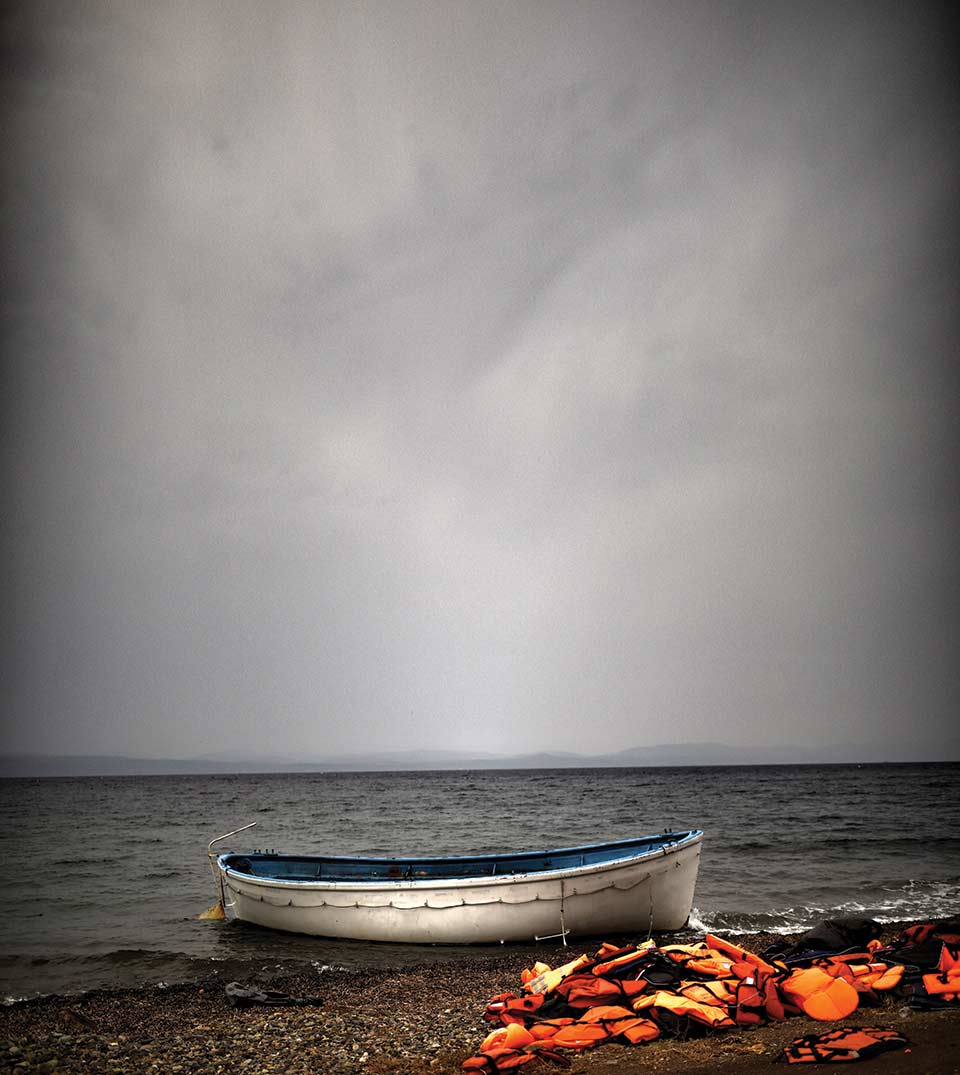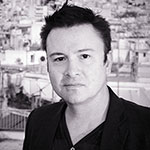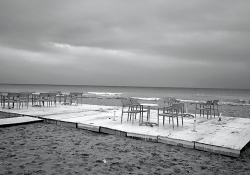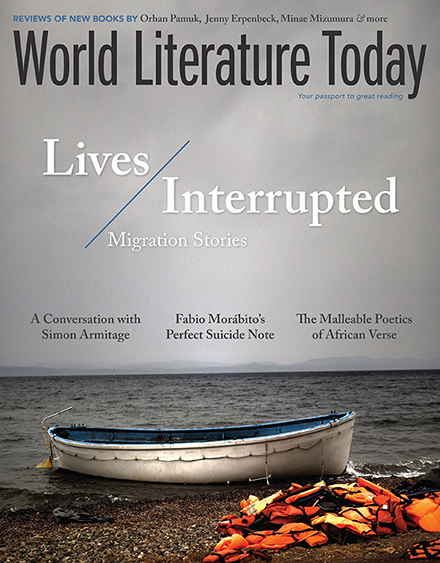The History of Grains

Life jackets and a boat used by refugees and migrants to cross the Aegean Sea from Turkey lie abandoned on the Greek island of Lesbos (Photo: Aris Messinis / AFP / Getty Images)
An intimate yet universal story of humanity breaking on your doorstep, “The History of Grains” depicts Greek islanders witnessing the mysterious arrival of abandoned vessels.
We had been tossing coins into the choppy waters over our numb shoulders, without uttering a word, and now our wishes for good luck were being fulfilled, unowned and ineffable.
That my three brothers pulled an empty, unidentified boat from the sea astonished everyone in our village, and made us think about the signs of times the way people think of incurable maladies before they are afflicted with a disease themselves. The twenty-foot trawler had capsized off our coast, and my brothers swam, propelling the vessel until they were able to put it back upright on its keel. No one knew where it had launched from. It was a coincidence or an omen, we thought, but when more empty boats were found kept afloat by air trapped between the hull and the water’s surface, we began to wonder if an omen should either ease us or put us in torment.
Alerts were issued from our village to the rest of the island to be on the lookout, and the Coast Guard divers split up into teams. A search was begun, but after three days they couldn’t find any sign of survivors and the officers abandoned their efforts.
The wooden vessels swayed graciously; you had to stare at the rhythmic calm of the blue water before you could begin to detect them. We watched with the eyes of a goat dangling off the edge of a cliff, suddenly knowing the difference between the sea and sky when normally it didn’t matter, an acute awareness that there was a seam between them, an imperceptible fracture as dangerous as the slippery cliff edge, that could cause the world to split open. We were mortified by the boats, not so much a mystery as a suspicion that we had been blessed with ignorance and now a great wrong had to be righted—though what the wrong was remained unspoken. It seemed as if a pair of cold, lifeless hands clutched around our necks, and everything explicable to our lives had suddenly become meaningless.
It was a coincidence or an omen, we thought, but when more empty boats were found kept afloat by air trapped between the hull and the water’s surface, we began to wonder if an omen should either ease us or put us in torment.
The lieutenant commander, who always got in a panic that we would fall prey to our bloodthirsty neighbors, blinked trying to speak as clearheadedly as possible.
“What does this mean exactly?” he asked the border guard as he looked at the radar. “If there are no survivors, where are the corpses?”
We didn’t know which possibility disturbed us more: the anticipation of change or our outworn definition of what was acceptable. Though we picked fights and lost our temper quickly, good manners were something we paid much attention to. We never showed up unannounced at your celebration, and when we were allowed to visit your house, we ran ourselves a bath until we were scrubbed clean and neat, our clothes pressed to perfection, teeth flossed, shoes spit-shined, like you might see in a wedding or a tourism commercial. We were trained to be impeccable hosts and guests, and the surreal sight of so many abandoned boats coming toward the shore left us wondering whether it was something to be opposed to rather than excused.
Our neighbors wanted their beaches all to themselves; they declined to take part in the relocation of trawlers and called for a summit on the fluidity of water. It was a palpable madness. Our island was not only swamped by boats but also by helpers, drawn to the vessels like moths to a flame. They came from all over the world, with ambiguous plainness, in their serious uniforms. Every day their number increased. They swarmed the beachside towns and traipsed the shore to measure the boats, to reckon every single spot on the wooden strip-planked hulls as an actor impersonating a crime-scene medical investigator might examine a body for clues. They spoke with utter conviction of the tragedy, and one understood immediately that they would not stop until the end of the world—which seemed to have more to do with the end of money spent than the solution to the mystery of the trawlers.
The overturned boats released the ghost of a creeping fear from long ago, when the first fish developed a body plan fit for walking on land while still living entirely in the water. What had happened when those creatures decided to break through, to flip sides and develop the same characteristics as terrestrial animals? Was there a moment when the former inhabitants realized that what they had always assumed was a separate world of food and water was in fact an army of new owners kept hidden, of warriors and poets who would inherit a good part of the land and tell their new stories of hope so they would find courage in the darkness?
Our fear was primal and nameless stemming from a prehistoric reorganization of anatomic design, from nature’s serious intent to catch everyone off guard, to throw off and replace everything settled and ordinary, every single old belief and habit, and erase the stench of fixity. It was the fear of most hominids that they will miss the moment of metamorphosis, they will fail to read the signs and avoid extinction—because any biped will tell you, avoiding extinction while sustaining the gestures of normal life is a full-time job that requires an innate sense of when to pray and when to fight.
Our world had shifted; things were falling apart. We looked and we didn’t view the sea; we saw one step at a time, one cell division and gene mutation at a time, one boat after another, little by little. When we added them all up we could see the signs οf an impending disaster, the exhausted shards of blue dissolving in our dark horizon, the malicious winters of our solitude ripple outward in ever-widening circles, a conspiracy of ravens taking sudden flight. When we added them all up, it seemed that the single thing we could see was the face of our frustration; our own reflection.
My father, the only priest located on the island, didn’t like bottles with squirtable tops. He taught us how to insert the knife into the glass bottle to help the mustard release and come out easier. He walked a fixed route every day, disliked unprompted enthusiasm, and was unwilling to adapt to the change of his routine. I could tell that the frown line between his eyebrows had deepened, not from the peculiar incidents but from our sudden decision to explore the wordless depths of our everyday life on our own terms. He thought that what people meant when they talked about omens was not what God really wanted to reveal. Lukas knew that there are things you do only when you are the only priest, the only doctor, and the only farmer on an a Greek island; you put yourself in God’s place trying to save what is most worth saving.
Lukas believed in God as if obeying the law of gravity. He was a man who had trust in Him not because he was oblivious to doubt or drew comfort from his faith but because he believed in the frailty of the human heart. In his memory, his adolescent landscape was one of flooded arteries and sudden deaths, of his deceased brothers affected by a moment’s feeling and human hearts attacked by missing beats. “Too much life can kill you,” he said.
His faith didn’t eliminate the need to doubt. It seemed to expand to fill the space around him, and around his life, an empty space the size of his memory that had to be filled with the explanations of why he had survived. Lukas had grown to love his litany of humble habits and schedule, the sameness of selfless desires and needs, the brainless routine he could rush through every day without thoughts and feelings. My father prayed to the routine of the mundane because it was his synonym for redemption.
One night, Lukas dreamt in a peculiar language—to call it foreign was not accurate, because he could understand the meaning, but not the words, and as in visions, Lukas could tell the difference between complexity and the very limits of the words at his disposal. My father believed that the men of God were like poetry translators; between the divine message and human muddled sense of meaning, they needed to invent, word after word and possibility after possibility, a new language that contained within it the experience of the inarticulable, or at least my father believed there was no prophecy to tell straight and needed to make sure that his voice would prompt new interpretations of what God wanted to tell him.
In his dream, a lost man—he knew it was him—was trying to walk on a carpet of moving boats in the sea with cautious leaps. Lukas was afraid of the gaps between the trawlers, a feeling of dread in his heart that made him feel like he was being tested. It was a strange awareness attending his dream, but when one of the boats started to speak to him in sounds of its own—in that hollow, throaty language he could not identify—my father slipped underwater. The boats closed over him, and Lukas couldn’t find a way to surface again.
For a moment, it looked as if he was going to die. Just as he began to run out of air, a man appeared from nowhere, and Lukas felt a gentle pulling sensation. The man reached out a hand, grabbed his hair, and pulled my father to the surface. Before he disappeared, the wind blew and lifted the boats into the air. A voice, no more than a whisper, said, this is your new land now, a phrase that sounded to Lukas, when he woke up, like a blessing, no clearer than that, but just as consoling.
He began to spend the days at a beach shack watching the waves break on shore, expecting something in their monotony to speak to him directly. He said this a little too anxious to be understood. My mother nodded her head, for a moment longer than necessary, incredulous but satisfied. It didn’t frustrate her that she was exiled to the margins of his life. Half the time she looked startled when she saw my father at the front door, as if he were a ghost. She took her role as wife seriously, but in all the years she had lived with him, her smile was often condescension masquerading as surprise—she applauded him for having faith and using words that made sense. Lukas believed in their marriage, and this sounded halfway logical to her. It was a conjugal, courtly love, but still love, sheer and inordinate, as quiescent as my parents.
Theophany is the orthodox celebration of Christ’s baptism, and every year my father asked that God would bring his blessing to the sea and water supplies. The service included singing hymns and young men swimming to retrieve a cross thrown into the cold water. My father wanted to assure everybody on the island that no harm would come from the trawlers, so he decided that this year, aside from the sea, the church should bless the floating boats as well.
Lukas asked the men to push the vessels back to the sea, cram aboard them, and wait for him to toss the golden handmade cross. Families from all villages had gathered along the beach to watch their sons, brothers, and husbands crossdiving, swollen with pride, as if the weight of the island hung from them. It was the mystery of these men’s alertness that caught our eyes and held us there, their ability to withstand cold temperatures, but also the overlap between pleasure and religious belief, the overwhelming pang of longing to see two worlds at once, our young and future self, the fascinating definiteness of the men’s half-naked bodies and the unfixedness of our recent sensibilities.
We waited impatiently. Next to me a party of old men were discussing chicken pot pie and perfectly flaky crust; fishermen who couldn’t swim, verbose grandmothers smoothing back their overcreamed-frappé-coffee-colored hair that strayed over their faces, boys in my grade whose knees and elbows were dotted with scabs and sores, oddly erect caricatures momentarily relieved from their obligations as unemployed fathers and mothers. They had all crowded in one place, an unholy assemblage of ghosts auditioning to be an allegory of triumph of the human spirit, pretending to be together in eager anticipation of a shared miracle of love when we were actually praying for jobs, insurance, and pension plans.
Wearing his formal religious vestment Lukas, along with a small choir, boarded one of the trawlers, which took them in deep water. I couldn’t hear my father, but I knew he was reading from the first chapter of Saint Mark’s gospel. I stood motionless on the shore as if posing for a portrait with the blankness of a scarecrow, in anticipation of his cue to release the white dove I cradled. Lukas raised the basil sprig in his hand, sprinkled the sea, and tossed the cross. The divers flung themselves in the air and plunged into the sea. They wrestled to troll the cross, churning the water, a formless colony of gulls submerging their heads to groom themselves and catch fish.
Then the men vanished. Entirely. As if they ceased to exist as visible forms. Some thought at first that it must have been a sort of visual deception, and that for a brief moment they were completely incapable of noticing what was happening before their eyes. They stood silent, looking at my father as if floored by his abilities to make appear and disappear. But the longer we expected the divers to resurface, the surer we were that something was terribly wrong with the world around us, as if we were at once dreaming and waking quietly from a troubled sleep.
The vessels started to sink. We weighed all the possible explanations as quickly as we could and screamed. It was a horrible noise, the sound of a sickening wind punctuated by the thin squeak from something that sounded like a clowder of maniacal cats, but it was more as if suddenly you could hear through walls from another world, the suffocating closing down of reason. Men and women jumped into the sea trying to locate the bodies of their loved ones, but the sinking trawlers stopped them.
No one will tell our story. No one will bear the listening: what we found down there laying on the blue depth of the sea floor, instead of trawlers and men, were dozens of fishlike species never seen before. Our suffering will never be a story of loss—it won’t teach you anything. It will be the slow shake of the head: our kinship with the sand filling up with ants, like a local orchestra of unpeaceful mourners singing for the dead flies they are carrying. The history of grains wishing they could flow against the wind.
Athens












